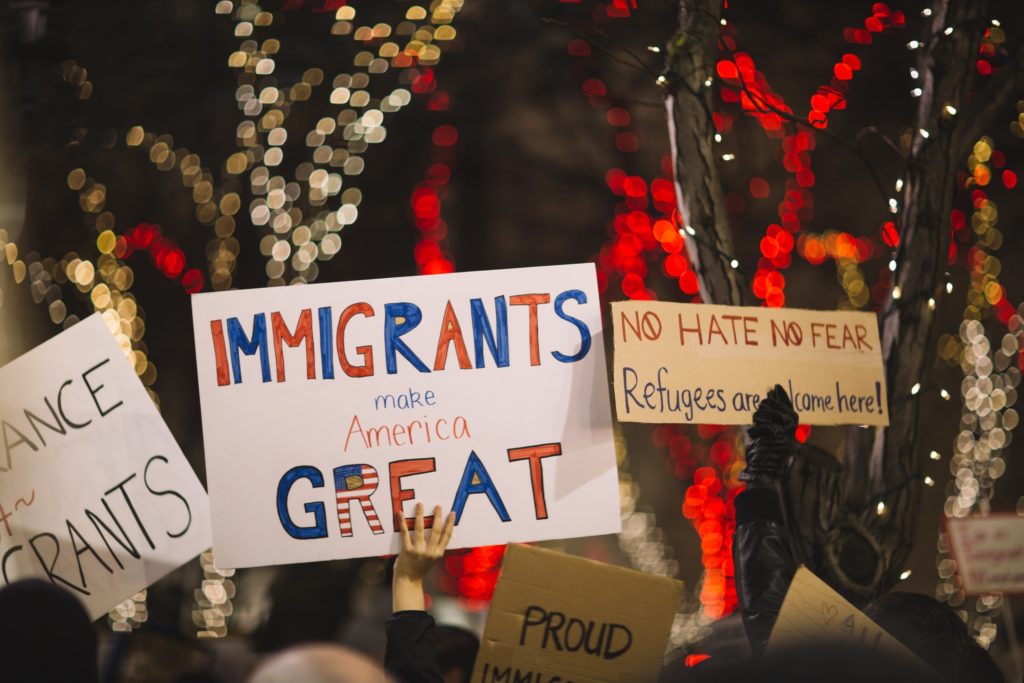I spent a week at the border with families seeking asylum. Here’s what they’re facing.
THE TORCH: CONTENTSBy Hayley Burgess
SEPTEMBER 13, 2019
Last week I was sitting on the floor of a stiflingly hot building in Tijuana with an 18-month-old girl. We were scribbling in a coloring book. She was sprawled on her stomach with a concentrated look on her tiny face, handing each crayon back to me as she finished using it. I was intent on keeping her busy so her mother, sitting in the chair next to us, could absorb the critical information an advocate was sharing with her and other asylum-seekers.
As the toddler tottered to her feet and reached up to grab her mother’s leg, I heard the advocate get to the family separation part of the presentation. The advocate explained to the parents in the room that it’s very likely that their children will be taken away from them when they cross into the U.S. And that right before it’s their turn to cross, they should write their information in Sharpie on their child’s arm in hopes they will be reunited. The parents were encouraged to dress with their warmest clothing closest to their skin, since they likely would be confined in “hieleras” for several days while they await their next step — in many cases, indefinite detention or being returned to extremely dangerous conditions in Mexico to wait for their court dates. As so many alarming reports are now showing, migrant families stranded in Mexico are facing homelessness, kidnapping attempts, assault, and threats of violence from those they are fleeing.
Image by StockSnap from Pixabay
If you don’t know about hieleras — the cold, concrete rooms where people apprehended by U.S. Customs and Border Protection are held for days with nothing but the layer of clothing closest to their skin — learn the horrifying details here.
The rest of the children, most of them no older than 11, were playing on the other side of the room. My fellow volunteers were keeping them distracted so they could enjoy a few hours of playing freely and to ensure that they weren’t hearing the same scary information their parents were. As most of these children were staying in overcrowded shelters or on the streets of Tijuana, I couldn’t help but think of how rare and important these moments of joy were.
A report released last week on the lasting psychological effect on the children caught in this situation is gut-wrenching. And reading it after spending most of my time last week with families about to navigate through the horrors of our immigration system, connecting these details to the kids I met and spent time with, breaks my heart. “[I] can’t feel my heart,” some children are saying. Or: “I can hear my heart beat.”
There are so many other moments that will stay with me. The time another young mother, also of an infant, asked us if U.S. immigration officials will take good care of her baby when the baby is taken away from her. Or if she’ll ever see her again. And we couldn’t in good conscience give her a comforting answer. The time I was at the nearby port of entry early one morning and watched a young girl hug her dad goodbye before she and her mother crossed without him. Or when I gripped another young mother’s hand and wished her luck before she and her family were hurried toward the vans taking that day’s small allotment of asylum-seekers towards the U.S. side of the border.
The parents I spoke with during my time there are brave, kind, and resilient. Most were fleeing some kind of government persecution, extortion, organized violence from cartels, or other significant threats to their family’s safety and had endured harrowing journeys to get as far as the border. Not only should their courage and sacrifice for their families be honored, but their legal right to seek asylum must be upheld. Instead, our government is tormenting them and their children.
The Trump administration has taken extraordinary steps to dismantle our asylum system. Despite the great work by so many to fight back, the damage has been substantial and will likely only get worse. Just this week, the U.S. Supreme Court allowed the administration to enforce a policy that makes it nearly impossible for these families to exercise their legal right to make their asylum cases while litigation challenging the policy continues. The consequences will be dire.
The right to seek asylum literally means life or death for these families. And yet our government punishes them and makes each step more miserable and dehumanizing than the last. Our system is being intentionally reconfigured to make life as difficult as possible for those seeking safety within our borders. It’s an ugly reality that we all must confront and work tirelessly to dismantle.
Al Otro Lado is one of the many crucial organizations both fighting these cruel policies and working to support asylum-seekers so they know their rights within what has become, under the Trump administration, a more cruel and complicated process. I encourage you all to learn more about what they’re doing and support them in their critical work.
Hayley Burgess is NILC’s media relations associate.






